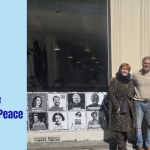A Lifelong Drive to Serve Others
When I was younger and people asked me what I wanted to do when I grew up, I would answer, “I want to help people.” That desire has always stayed with me. Over the years, I’ve been actively involved in all types of volunteering. At 17, I began studying international project management and humanitarian work. Later, I graduated with a Master of Science in Sustainable Development. Through these experiences, I came to realize that what I value most is making a long-term impact on people’s lives. While emergency aid is vital, I’m more drawn to long-term solutions and sustainable processes. That’s why the vision of Serve the City Belgium resonates with me, as it focuses on being transformational rather than transactional, which perfectly aligns with my own approach. Furthermore, I deeply appreciate Serve the City’s commitment to making volunteering accessible to everyone. I believe many people see their city only through the lens of how they wish it to be. Volunteering offers a powerful way to explore its many layers and realities. It allows us to meet people and hear stories we might not otherwise encounter. In my view, this kind of engagement can only broaden perspectives and open minds.
Discovering the Justice Dimension of Climate Change
As you begin to delve deeper into the topic of climate change, it quickly becomes clear that it’s ultimately about people. It’s driven largely by human actions, and its consequences will fall on people worldwide, more heavily on those already vulnerable. One thing I brought up during my workshop was climate justice. I think it is a crucial concept to understand. This social concept recognizes the unequal historical responsibility of climate change. Indeed, the countries that have developed while emitting the most are now the ones that suffer the least from climate change’s impacts, as they are best equipped to deal with it. However, the countries that have contributed the least to CO2 emissions are often hit the hardest and, due to a lack of resources, are unable to prepare for abrupt events, respond to them and recover. Recognizing this injustice is paramount to implementing a fair climate adaptation and mitigation plan. My interest in the intersection between social justice and climate change comes from the disconnect that often exists between the two. I believe we are neither taught nor shown clearly enough how climate change is already having a drastic impact on people’s lives, and how, in the long term, it could lead to truly catastrophic consequences. Some of the issues that come to my mind include the rise in conflicts driven by resource scarcity, the forced migration of populations who can no longer sustain life in their home regions, and, more broadly, the increasing frequency of extreme weather events and global pandemics. Research has demonstrated clear links between these phenomena and climate change, yet this human dimension is largely absent from the news, social media, and educational systems. I think it’s dangerous to frame climate change solely as a threat to nature and biodiversity, topics that many people could feel emotionally or practically detached from. If we could better connect climate change to the realities of human suffering and inequality, I believe we could significantly increase public engagement and inspire a much broader sense of urgency.
Linking the Climate Crisis to Human Hardship
Why is this link important to highlight? As I just explained, highlighting the link between climate change and the challenges faced by vulnerable communities is crucial because it reframes the issue as not just an environmental crisis, but a human one. Climate change doesn’t affect everyone equally. Whether it’s rising food insecurity, increased exposure to extreme weather, or the loss of livelihoods, these impacts can deepen existing inequalities and even lead to disastrous side effects, peace instability being one of them. By making this connection clear, we help people understand that climate action isn’t only about saving the planet —it’s also about protecting people and promoting justice. This perspective can mobilize a broader range of people who might not relate to environmental issues but do care deeply about fairness, human rights, and dignity.
Building Sustainability into STC’s People-First DNA
Serve the City mobilizes and manages volunteers around the world, enabling people to engage in activities that support those in need, based on the specific priorities of each local context. At its core, Serve the City is people-centred and value-based. Indeed, its mission is to help individuals in our cities, driven by values such as respect, humility and compassion among many others. But beyond that, STC also seeks to build communities of people committed to making their cities better places to live. In this spirit, we aim to develop a sustainable vision that integrates both social and environmental dimensions. Our goal is not to become an eco-centric NGO, which would heavily focus on environmental degradation or biodiversity loss, but rather to integrate some environmental objectives into our long-term strategy. As previously mentioned, the impacts of climate change disproportionately affect the most vulnerable, the very people we are already serving through our projects. From this perspective, caring for the environment is entirely aligned with STC’s mission. However, this connection must be made clear to our volunteers, partners, and stakeholders. That is why we will soon start implementing internal sustainability policies, launching nature-focused volunteering activities, and assessing our initiatives through the lens of emissions and long-term impact. It’s not a shift in mission; it’s a deepening of our commitment to the people we serve.
Communicating & Measuring Green Impact in Social Work
It may not be a direct obstacle, but one of the biggest challenges is clearly communicating the connection between our existing mission and our environmental efforts. As I mentioned earlier, we don’t want people to feel lost or think that Serve the City is suddenly shifting toward being an eco-centric NGO. That’s why transparency and clear messaging are absolutely essential. Another challenge lies in the practical work involved. Starting to calculate, assess, and monitor the environmental impact of each of our projects is a major task that requires time, effort, and a shift in mindset. Lastly, in the field of social support, especially when it comes to emergency aid, it’s often difficult to prioritize sustainability. The urgency of the need usually pushes us toward the fastest and most cost-effective solutions, which are not always environmentally friendly. Balancing immediate needs with long-term environmental responsibility is a complex but necessary challenge for STC, especially for our food projects. In short, bearing environmental considerations in mind for our projects is essential, yet this shouldn’t have a negative impact on our beneficiaries and the quality of help they will receive.
Everyday Eco-Actions Volunteers Can Start Now
There are so many simple actions we can integrate into our daily routines to live more sustainably. Beyond that, it’s also about supporting organizations that align with your values —for example, NGOs that are transparent, ethical, and committed to both social and environmental justice. Give your time, your energy, or your money to causes that truly matter to you. Take the time to research, stay informed, and don’t hesitate to use your voice, whether it is for boycotting, signing petitions, or joining protests. For those living in Paris, Serve the City Paris has compiled a helpful list of activities, projects, companies, and NGOs that can guide you toward making more sustainable choices in everyday life. It’s a great starting point for anyone ready to take meaningful action.
A City Where Respect Fuels Sustainability
I’m naturally an optimistic person and tend to stay very positive. Still, I have to admit that my city and our current society, are far from the vision I wish for when it comes to justice and sustainability. Ideally, I would dream of a city where people take the time to understand the challenges their communities face and, more importantly, act upon them. To build cities that are truly just and sustainable, I believe respect must be a core value. When I say respect, I mean respect for people, for diversity, for the vulnerable, for the planet, and for future generations. What’s essential is cultivating the habit of stepping back and looking at the bigger picture, not just focusing on the present, but also on the long-term consequences of our actions. If more of us paused to reflect on the broader impact of our choices, I’m convinced we would act more sustainably and be far more mindful of how we interact with the world around us.
From Eco-Anxiety to Empowered Collective Action
This might sound a bit direct, but I believe it’s important to remind people that neutrality and inaction only allow things to get worse. To avoid falling into anxiety, information must be followed by action. Once you become aware of the social or environmental challenges of your society, taking steps to address them is essential to avoid feeling overwhelmed and stuck in your own thoughts. I also want to emphasize that action doesn’t have to happen alone. When you start getting involved with others, you realize you’re part of a wider community of people who care and who are ready to help and make a real impact. You’re no longer stuck alone with alarming information; you’re surrounded by people working toward the same goals. The scope of the climate crisis might seem daunting, so people usually feel like their actions might have no impact. But at STC, we usually say, “Many people doing small things together can make a big difference”. I think it does apply perfectly to this situation. If you start acting within a larger community, you get empowered by the potential change you can make together. That’s why I think Serve the City does such an incredible job by creating a true sense of community around volunteering and making a positive difference in society.



